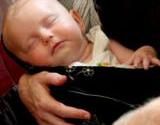Main Menu
Antidepressants and Breastfeeding
If you’re a new mom and you have a history of depression or anxiety, you may be wondering if you can take antidepressant medication while you breastfeed your baby. Likewise, if you experience postpartum depression, you might worry that you’ll have to wean your infant if you decide to begin taking antidepressants.
Doctors generally agree that the risks of passing antidepressants through your breast milk to your baby are less than the risks of being depressed or anxious while tending to a newborn. It’s also better to go on medication immediately, rather than waiting until you’ve weaned your baby, if you’re depressed or anxious, since you want to make sure your infant gets all the benefits of the nursing relationship. Postpartum depression is often more severe, and worsens more quickly, than depression outside of pregnancy or birth, so it’s important to treat it right away.
SSRIs, the newest class of antidepressants, are the safest medications to take if you’re nursing. SSRI meds include Prozac, Zoloft, Paxil and Celexa. Zoloft, in particular, has a very low breastmilk transfer rate: in one study of 11 infants whose mothers nursed them while taking Zoloft, the medication was undetectable in seven of the babies’ bloodstreams, and present only in tiny amounts in the other four babies. Paxil had the same results when studied: out of 48 babies monitored in three studies, it was detectable in only one infant’s blood. Prozac is slightly higher-risk, especially if the mother has also taken the drug during pregnancy: it may show up in higher levels in the baby’s blood, and could make babies irritable or upset their stomachs. This is due to Prozac’s longer half-life.
There are no recorded incidences of longer-lasting effects in children whose mothers took SSRIs while breastfeeding – studies indicate temperament, IQ, behavior and activity level don’t vary if a child has been exposed to SSRIs through breast milk.
Other antidepressant medications, such as the older tricyclics like Elavil, have a very low rate of transfer through to breast milk. The tricyclic medication Doxepin, however, has a high transfer rate and shouldn’t be used while nursing. Tricyclics tend to have more severe side effects on the mother than on the child – mom may experience dry mouth and constipation.
There are mixed opinions as to the use of lithium while nursing: some doctors advise against it, while others see it as a last-ditch option when all other antidepressants have failed to work. If a mom takes lithium when breastfeeding, the infant’s blood levels will probably need to be checked every two to four weeks.
If you’re taking antidepressant medication while nursing, tell your pediatrician, so he or she can keep a close eye on baby’s health. If you’re considering weaning, it’s important to tell your doctor, because going too fast may mean your baby suffers withdrawal symptoms: likewise, if you’re weaning off your antidepressant medication, tell your pediatrician so he or she can monitor baby’s possible symptoms.
photo by Nyboer Creative
This information is solely for informational and educational purposes only. The publication of this information does not constitute the practice of medicine, family planning, child psychology, marriage counseling and this information does not replace the advice of your physician or other health care or mental health care provider. Neither the owners or employees of NaturalFamilyOnline.com or the author(s) of site content take responsibility for any possible consequences from any treatment, procedure, exercise, dietary modification, application of medication or any other action involving the care of yourself or any family members which results from reading this site. It is always best to speak with your primary health care provider before engaging in any form of self treatment. Additional information contained in our Legal Statement


